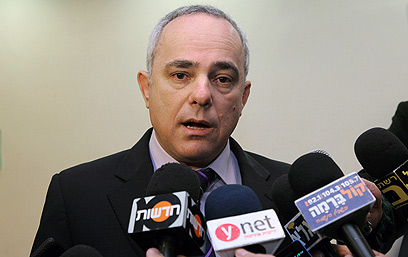
Treasury mulls raising VAT rate
Treasury is looking into ways to trim State deficit, including raising Value Added Tax to 17%
The budget cuts will not wait until 2013 – the Treasury is looking for immediate ways to pull the government out of its serious deficit, some of which are due to be implemented as early as July 1.
According to estimates, the government budget is currently short some NIS 20 million (roughly $5.2 million), mostly due to unexpected but significant increases in government spending in the past two months, as well as decreased tax revenue.
Related stories:
- IDF warns of budget cuts' debilitating effect
Until recently, the order from the heads of the Prime Minister's Office and the Treasury was to prepare steps for the 2013 budget. But senior officials have now decided to move ahead with certain critical measures to cut the deficit and increase the government's coffers this fiscal year.
"It seems that we won't have a choice. The budget situation is worrying, and some of the steps can't wait until January," a senior Treasury official told Mamon on Sunday.

Finance Minister Yuval Steinitz (Photo: Marc Israel Sellem)
And so the Finance Ministry's budget department and the Israel Tax Authority are preparing a few basic but serious measures to go into effect this July or August. Some might have to be delayed until September if they don't receive the requisite government approval and Knesset legislation in the few weeks left before the second half of the 2012 fiscal year starts.
The planned measures include:
- Raising the Value Added Tax (VAT) from 16% to 17%, which would bring the government an additional NIS 4.2 billion ($1 billion) a year (NIS 2.1 billion in the current fiscal year.) An announcement of the decision is expected to cause a flurry of expensive purchases like apartments and cars before it takes effect, as consumers seek to evade the extra 1%.
- Raising the blue tax on cigarettes and the tax on alcohol – which would provide an additional NIS 400 million ($104 million) for the state annually. This kind of decision can be taken retroactively by the Knesset Finance Committee.
- Cutting ministry budgets by NIS 2 billion ($519 million), including the defense budget. These cuts are expected to garner resistance in the government, and it could turn out that the final cut will be smaller and will exempt the education and welfare budgets – against the advice of the Finance Ministry.
- Delaying a number of infrastructure projects, mainly paving roads and laying new railway tracks, that were due to be executed this year. This would represent a savings of some NIS 1 billion ($260 million).
All these represent over NIS 5 billion ($1.3 billion) in savings and increased revenue for the current fiscal year. For 2013, the Treasury budget department and the ITA will prepare a series of additional cuts and revenue enhancement expected to comprise NIS 12-15 billion, ($3.1-3.9 billion) in hope of keeping deficit growth within the target 3%.
A larger deficit could cause Israel's credit rating to drop and interest rates to rise on its outstanding loans. The PMO and the Treasury believe that the broad coalition will be able to pass the painful cuts within a few weeks.










